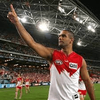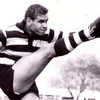BringBackTorps
Club Legend
- Jan 5, 2017
- 2,963
- 1,827
- AFL Club
- GWS
Female GR AF has been having strong growth in the NSW North Coast comp. (not to be confused with the Northern Rivers AF comp., for areas adjacent to the Qld. border). The Swans AFLW team, starting December 2022, is expected to greatly stimulate this growth.
"[in 2022] AFL North Coast will launch its Youth Girls Under 14 competition. This comes off the back of the phenomenal success of the Youth Girls Under 17 competition in 2017, and the Women’s competition the following year.
Matt Crawley, Northern NSW Development Lead, said that female participation continues to grow year on year. “After just five seasons of Youth Girls footy we now find that 28% of participants in our Junior Competition are girls, and despite the Women’s Competition starting a year later, 25% of participants in our Senior Competition are Women.
“Other regions that have already implemented the younger girls only divisions have seen an explosion in the numbers of girls who are keen to play and we know it will be the same on the North Coast. A number of clubs have ready made teams so the ground work is already done.”

 aflnorthcoast.com.au
aflnorthcoast.com.au
"[in 2022] AFL North Coast will launch its Youth Girls Under 14 competition. This comes off the back of the phenomenal success of the Youth Girls Under 17 competition in 2017, and the Women’s competition the following year.
Matt Crawley, Northern NSW Development Lead, said that female participation continues to grow year on year. “After just five seasons of Youth Girls footy we now find that 28% of participants in our Junior Competition are girls, and despite the Women’s Competition starting a year later, 25% of participants in our Senior Competition are Women.
“Other regions that have already implemented the younger girls only divisions have seen an explosion in the numbers of girls who are keen to play and we know it will be the same on the North Coast. A number of clubs have ready made teams so the ground work is already done.”

Two incredible opportunities for local female footy - AFL North Coast
North Coast girls and women have been presented with two fantastic opportunities that will continue the rapid growth of female footy locally, with the Sydney Swans getting an AFLW licence and AFL North Coast starting a Youth Girls Under 14…Read more ›
 aflnorthcoast.com.au
aflnorthcoast.com.au
Last edited:
















